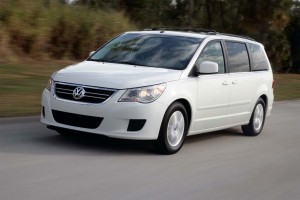
European models top the list - even if the number offering, the VW Routan is actually a rebadged version of the Detroit-made Chrysler minivan.
That sometimes forgotten generation of post-Baby Boomers, Gen-X has moved from the grunge and rock-and-roll life phase to raising families of their own – which may explain why “family-friendly” is the key word in describing the sort of vehicles that wind up most on their shopping list, according to a new study.
As they become increasingly affluent, this relatively small group of the population – born between the mid-1960s and early ‘80s – have developed a clear taste for the roomy, well-equipped vehicles they can use to haul kids and grandkids, as well as the other accoutrements of an established life, finds TrueCar.com’s analysis of Gen-X buying data.
Significantly, there are signs that the old maxim that each generation moves away from the cars their parents drove is at least partially true. Among the Top 5 models on the Gen-X list is only one Japanese brand, fourth-ranked Mazda. The most popular brands, in order, are Volkswagen, Land Rover and Audi. Rounding out the group is the only domestic model, Jeep.
Japanese makers haven’t vanished entirely, Infiniti coming in sixth, followed by Acura, Nissan and Honda, with Mini squeezing into tenth. But, notably absent are any of the Toyota brands; Lexus has long been associated with the older end of the Boomer generation, along with Toyota itself. Another recent TrueCar study showed that youth-oriented Scion is the top pick of the newest generation, the Millennials, but Gen-X may simply have outgrown its offerings.
“Generation X buyers have a work hard/play hard mentality and chose cars that were comfortable and convenient for their lifestyle. They chose larger, more luxurious cars to take their families on vacations or kids to play soccer with ample room to store equipment and luggage,” said Kristen Andersson, Automotive Analyst for TrueCar.com.
While Toyota and some other Asians, including Hyundai, might be disappointed by the Gen-X buyer study, it is likely even more frustrating for Detroit. The domestic makers have largely lost out on import-oriented Boomers, so they’ve been crossing corporate fingers hoping that generational shifts would work in their favor with Gen-X and the Millennials. So far, however, they’re gaining only modest ground – though the latest shift in product strategy could eventually earn a following.
The European brand bias resulted in some curious twists with the new TrueCar study. Consider that the top model for buyers age 28 to 45 during 2009 and 2010 was the Volkswagen Routan. That has been an also-ran on the overall sales charts, most minivan customers ignoring the VW offering in favor of the Chrysler and Dodge models it is based upon as part of a product sharing program.
Second on the list is that work-hard-play-hard icon, the BMW M3 – in sedan form, of course, so the kids can always squeeze into the back seat when mom or dad are late for work.
The Nissan Quest minivan landed in third, while big SUVs, minivans and crossovers dominated the rest of the list. The only Detroit model was the Korean-made minicar, the Chevrolet Aveo.
